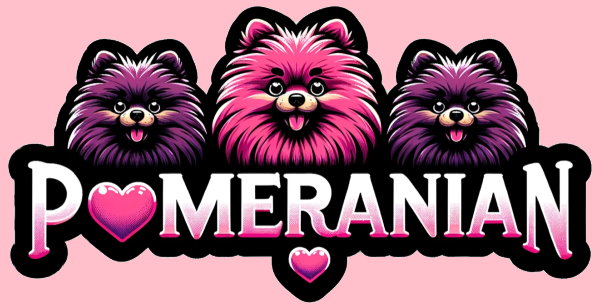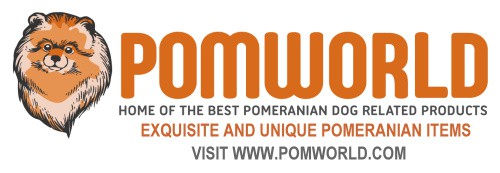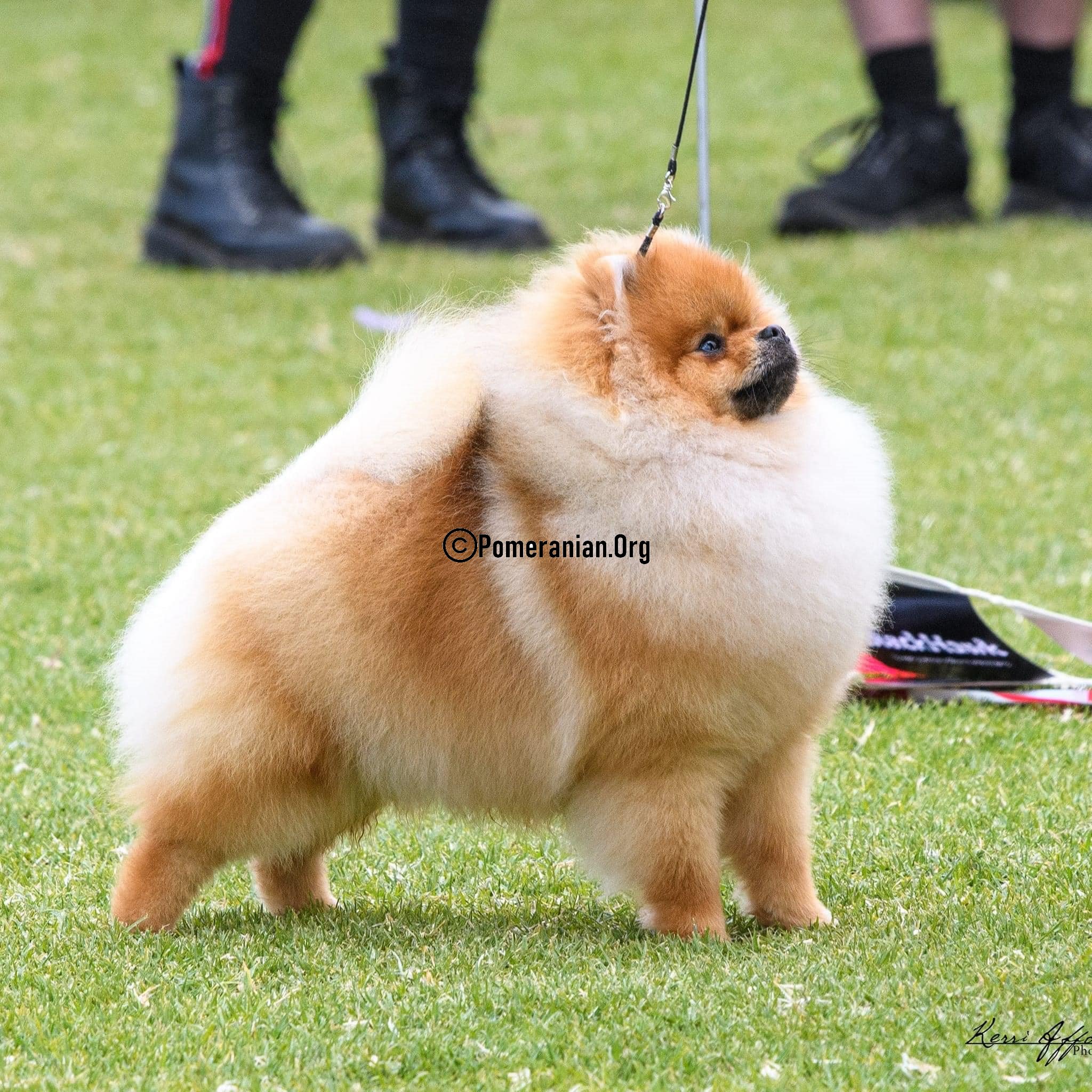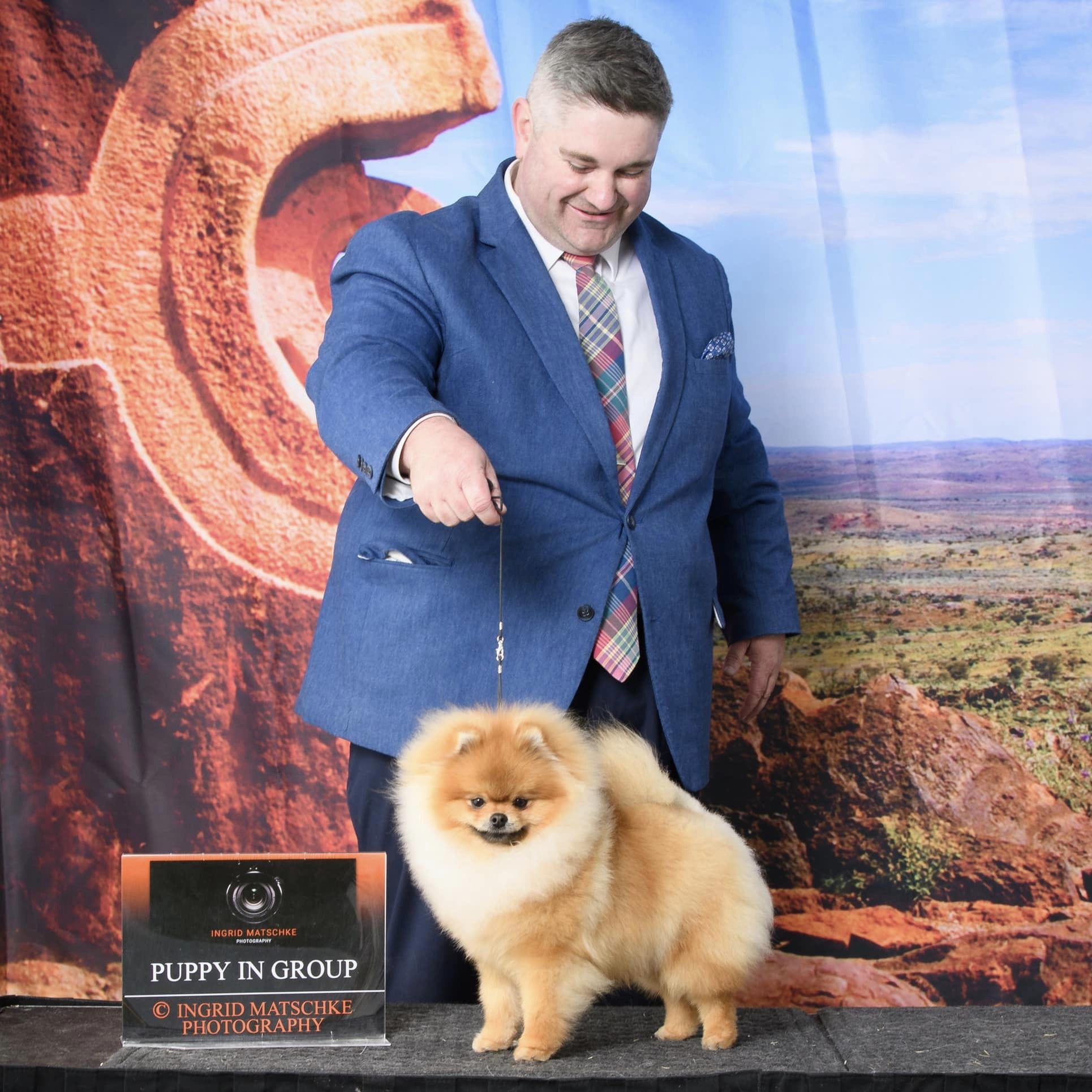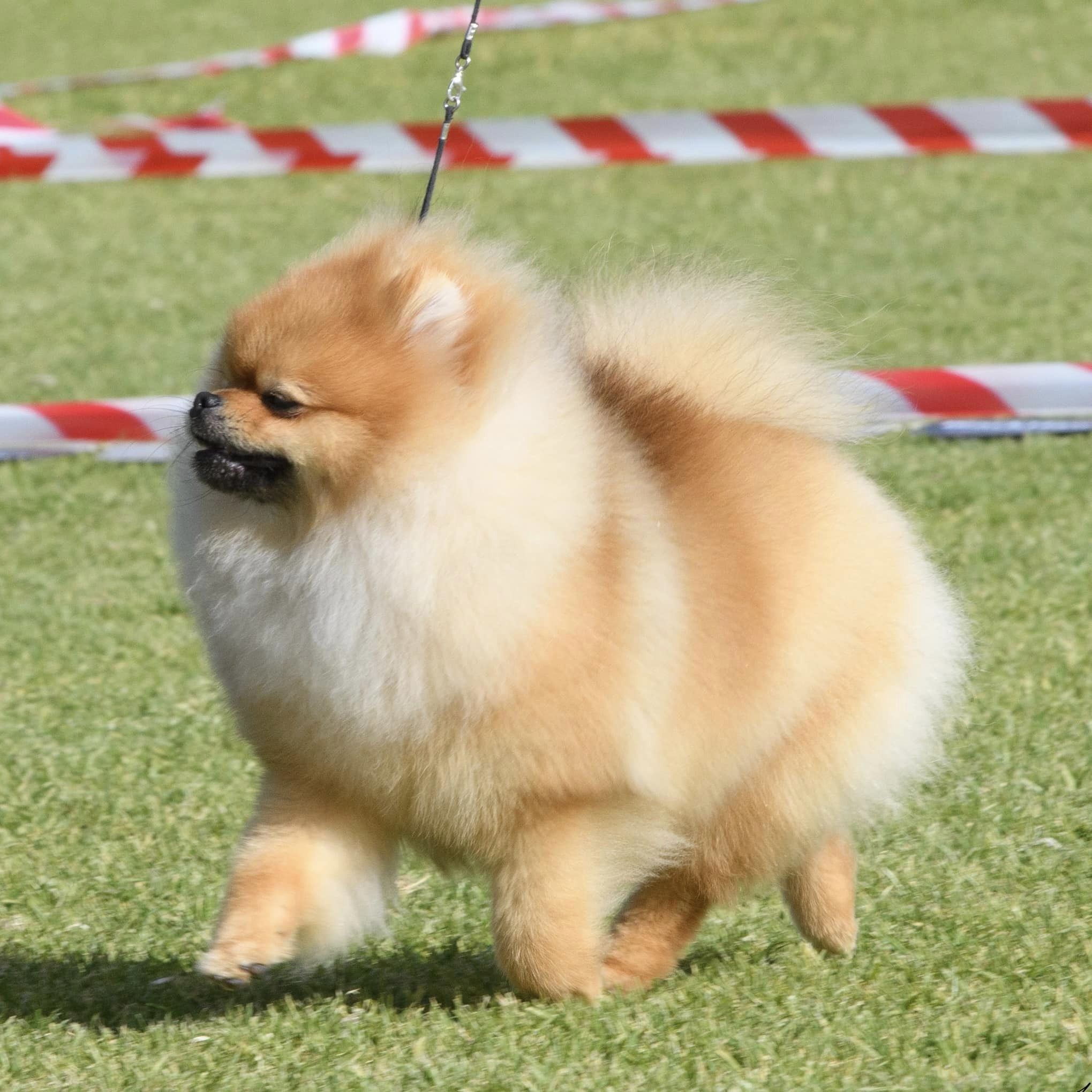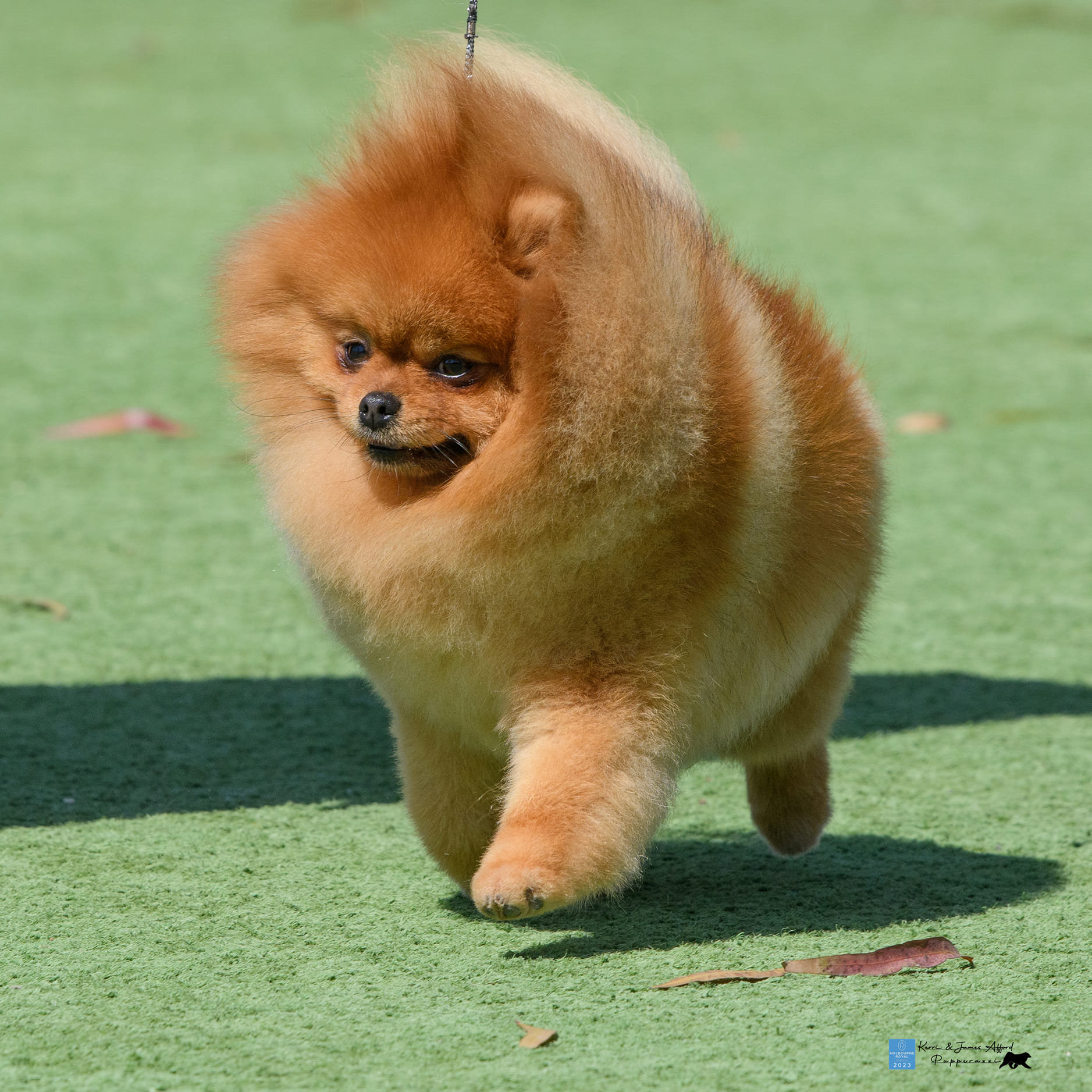Last Updated on 29/06/2023 by Dochlaggie. Post first published on February 22, 2020.
Most dog owners are concerned about their dogs becoming overweight. This is especially true with toy dogs, including Pomeranians. Because he’s already very small, it doesn’t take much for him to be too thin or even a fat Pomeranian.
Because your dog is furry, it can be hard to tell if he’s carrying extra pounds or if it’s just the fur. Even a meagre one pound of weight can make a Pom look much fatter because of his initial size. If your dog was a Husky, the one pound wouldn’t make any difference.
Until your dog reaches two years of age, don’t be overly concerned about weight because he’s in his growth phase. Once he reaches two years of age, then he’s an adult and his weight should stabilise.
As a puppy grows, he can gain weight rapidly and this should balance out as the structure of his bones grows. Diabetes and thyroid diseases are often blamed for weight gain but these issues aren’t often seen in puppies. They’re medical problems that adult dogs may contract as they age.
Once he hits the two year mark, you must focus on ensuring his weight remains stable so his health is as good as it can be.
What Happens if You Own a Fat Pomeranian
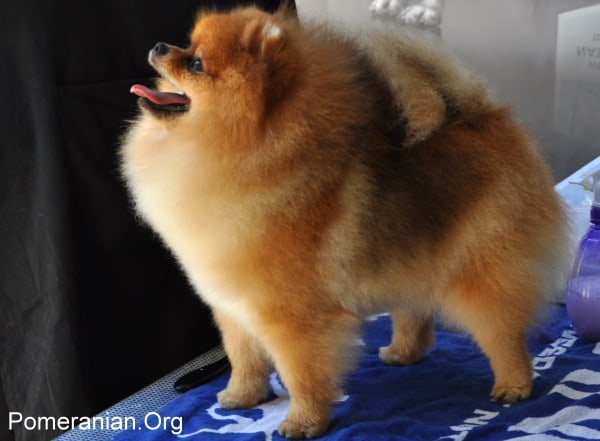
Humans and dogs suffer health problems if they carry excess weight. In dogs, the problems can include:
- Additional stress on his heart and other vital organs.
- More stress on his joints.
- Restricted mobility which means he’ll find it harder to play with you and your family and get enough regular exercise to maintain good health.
- Diabetes – a very complicated chronic disease in dogs as well as humans.
- So the list goes on and on.
If you can’t easily weigh your dog using scales, weigh a basket and then put him in the basket on the scales. Deduct the basket’s weight and you’ll have your Pom’s weight.
Is the weight due to eating or medical problems? Any adult dog that seems to be overweight must be thoroughly checked out by a vet so that medical problems can be eliminated as the cause. Most owners will say their dog “doesn’t eat much” and that the cause must be a medical one.
However, 43% of dogs carry excess weight and only 6% of that group are suffering from genuine medical conditions that cause the weight problems.
What Caused My Dog to Become a Fat Pom?
It’s the same with dogs as it is with people. If the dog eats more calories than he burns off, he’ll gain weight. Most dog owners only have good intentions and don’t think their dog eats too much. However, there are four different ways for your dog to take in extra calories:
- Snacks – It’s common for dogs to be given treats during the day and each treat has some calories which all add up by the end of each day.
- Performance Treats – Owners often give their dog a treat when he behaves or does what you tell him to do. Food shouldn’t be used for rewards. Use hugs, kisses and praise as training tools, not edible rewards which have calories in them.
- Begging – It’s almost impossible to resist your dog’s “puppy dog eyes” when he’s begging for food. He’ll beg until you train him not to beg by never giving him anything when he begs. If you give him something even once, it breaks all the training you work so hard to achieve.
- The Fussy Eater – If your dog doesn’t eat his food, that can cause problems. Don’t give in and feed him your human food because he’ll keep on ignoring his own food.
Exercise is a vital part of your dog’s life. It’s easy to neglect him so you must schedule time to take him for walks every day. It helps his health and yours if you do it for a minimum of 20-30 minutes per day.
Is My Pomeranian Fat?
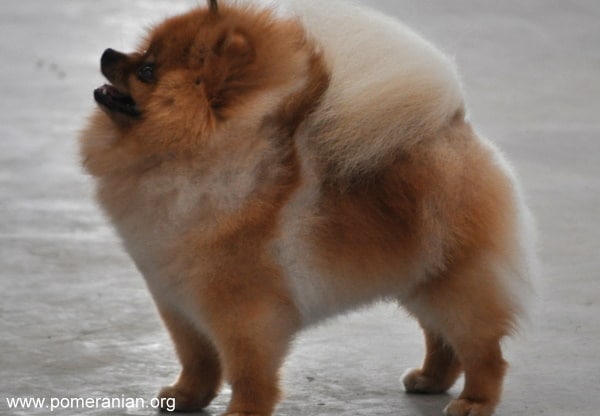
Look at his rib cage. Look and touch the bones to learn what you need to know.
Looking – Stand over your Pomeranian. The easiest time for this is after his bath when the fur is wet and not in the way. Does his stomach curve inwards? Can you see the distinction between the lower and upper parts of his torso? If you can’t, he has too much fat.
Touching – Using your fingers and pushing his fur aside, touch his ribs. If he’s underweight, his bones will be against his skin and may even protrude in spots. If he’s overweight, you’ll feel a thick amount of fat between the bones and your fingers, if you can even find his ribs at all. If you can’t touch the ribs, your dog is obese.
Is your Pomeranian having Trouble Breathing?
There are some overweight dogs who can have difficulty breathing, and this includes Pomeranians. This breed is susceptible to issues like a collapsed trachea. If you see your Pomeranian is finding it hard to breathe normally, you need to take him to the vet urgently.
Being overfat can make a trachea condition worse. If your dog is fortunate enough not to have a collapsed trachea but his breathing is still labored, he may simply be carrying extra weight. There’s no excuse for your Pomeranian to face breathing issues unless his trachea has collapsed so you need to place him on a strict diet immediately if this is what is happening to your Pom.
Lacking Energy
If a Pomeranian begins gaining too much weight, he won’t feel as energetic as he did when he was bouncing around. You’ll see him spending a lot more time resting or sleeping. A typical adult Pomeranian should sleep for 12-14 hours and this is ample to stop him lazing around too long.
Your Pomeranian may not have much interest in any activities or in running to greet guests as often as he normally would do. Even when it’s mealtime, your dog might take a leisurely stroll instead of his usual mad dash to his bowl. If you notice these symptoms, your Pomeranian may be fat.
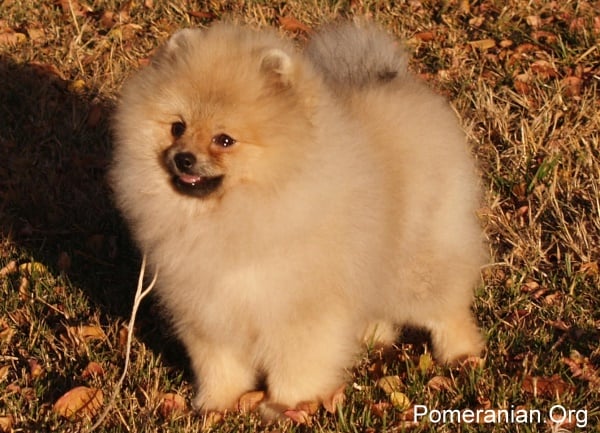
A healthy Pomeranian needs loads of energy for all his daily activities, and any unexpected events. In fact, Pomeranians are well-known for possessing endless amounts of energy and this is a trademark characteristic of the breed.
Healthy adult Poms (without health challenges to impede them) can walk upstairs. However, I’ve seen that, as my adult Pomeranians move into their senior years, it’s quite common for them to lack energy when attempting to walk up any stairs. Whenever this is the case, it’s up to us to care and help them.
If your Pom has trouble getting up the stairs, and also suffers from a luxating patella, you don’t need to be worried about him being overweight because you know the reason. This occurs when your Pomeranian’s kneecap slips in and out of his knee socket, causing a great deal of discomfort and makes it harder and less appealing to him to move around.
If his knees are fine and stairs are still obstacles, it’s probably because he’s carrying excess weight. It’s unacceptable for a healthy Pomeranian to get up stairs and other easy obstacles. It’s your responsibility to ensure he can manage to do this every time he wants to get up those stairs.
Above Average Weight
We love and care for our Pomeranians and only want the best, where they’re concerned. However, if you see your Pom’s weight is heading towards the higher than normal range, you might have an overweight dog.
This only applies to adults because they have stopped their normal growth. The majority of Pomeranians cease growth when they’re one year old but some keep going until they’re 15 months of age.
On average, a Pomeranian will weigh between 4 and 7.5 pounds (1.9 to 3.5 kilograms). It’s possible that you have a “throwback” Pomeranian, meaning he possesses loads of genes from various ancestors.
If he’s healthy, a Pomeranian’s average weight of 4 to 7 pounds will be 7-12 inches high. If yours is bigger, he can weigh more as well.
How Do You Help a Fat Pomeranian Lose Weight?
You can give your dog more exercise and reduce his food each day to help him lose weight over a period of time. For toy dogs, this is ideal as they can’t handle sudden major changes due to their sensitivity. Increasing the walks by 10 minutes and reducing meals by around 20% will certainly help in the long term.
How Much to Feed a Pomeranian
Pomeranian food amount daily requirements are as follows:
- Decimal: Weight in pounds divided by 2.2 x 30 + 70 = calories required. E.g.: 5 pounds divided by 2.2 = 2.27 x 30 = 68.1 + 70 = 138 calories needed each day.
- Metric: Weight in kilograms x 30 + 70 = calories required per day. E.g.: 2.26 kg x 30 = 67.8 + 70 = 137.8 calories required per day.
Calorie Counting
If you use the calculations about calories covered above, you then feed your dog normally in three days time but monitor all the calories he ingests. Average it out to see how much he consumes every day and if it’s higher than what your goal is, slowly reduce it.
Facts to Consider Before Losing Weight
If the reasons listed above have persuaded you that your Pomeranian needs to lose some weight, there are a few important facts to think about before starting. If your Pom has a good reason for carrying extra weight, then you don’t have a valid excuse for altering his exercise regimen or diet.
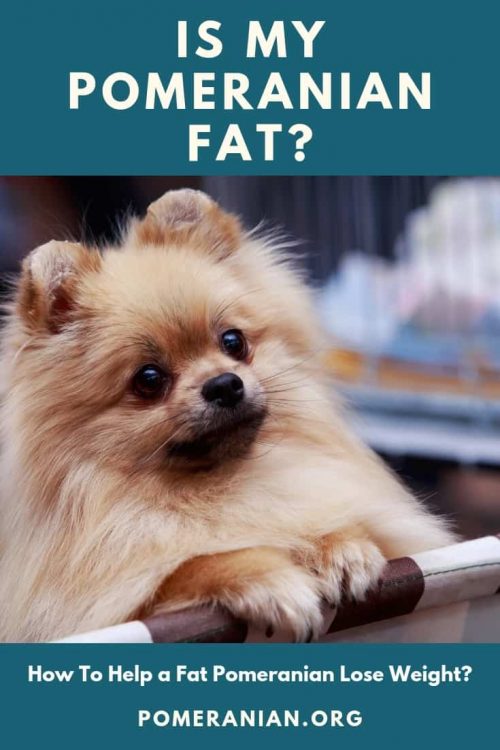
One big reason is if he hasn’t reached adulthood yet. Puppies often have a plump look as they’re in a growing phase and prior to reducing their weight naturally. One extremely bad thing you can do is not feeding your Pomeranian puppy sufficient food because you’re under the misconception that he’s carrying too much weight.
Pomeranians have various strong genes that have directly come from their relatives, the wolf-dogs. These dogs are nicknamed the “throwback” Pomeranians because their size is bigger than normal.
Tips on Helping Your Pomeranian Shed Some Unwanted Pounds
If you strongly believe your pet Pom must shed weight, you worry he may gain too much weight down the track, or you just like to see him in the best of health, I strongly recommend you keep reading to learn how to guarantee your Pomeranian is fit and healthy all the time.
Ensure Your Pomeranian’s Food Is the Best Quality You Can Buy
There’s an old saying – “we are what we eat” – and this applies equally well to Pomeranians and other dog breeds, as well as people.
Consume the Best Quality, Healthy Food
Homecooked meals are best. Replace some of the meat and other ingredients with vegetables like carrot, zucchini and pumpkin. The vegetables will add bulk and fiber and help your Pomeranian feel full while decreasing calorie intake. If you can’t cook for your Pomeranian, feed lower calorie commercial dog food.
Keep Records of the Quantity of Food Your Pomeranian Consumes
The easiest way to track how much your dog eats is by using a paper-based notepad on an online Excel spreadsheet. You can also record what food he eats at each meal. The spreadsheet is better because you can use formulas to measure how much he’s eating in relation to how much weight he gains and what his eventual stable weight will be.
You Should Weigh Him each Week
If you record the amount of food your Pomeranian consumes, weighing him will be a vital part of is overall care. Identifying your Pom’s ideal weight versus the amount he eats is an essential method for making sure he’s healthy and fit.
However, weighing a dog isn’t always simple. Ensuring he remains seated can be a source of endless frustration. If you have an empty box or container he can sit in, it’s handy because you’ll weigh the container and subtract that from the final weight to accurately get your Pomeranian’s weight. If this is all too complicated. purchase a dog scale.
Reduce His Treats
It’s pretty hard to find a person or animal anywhere in the world who doesn’t need a few less treats. If you’re attempting to help your Pomeranian shed weight, less treats during the day is a great step.
I really like to give my Pomeranians a mix of healthy treats when they do something good or obey me. This is an incredibly effective method of teaching them your rules and how you want things done. If you resort to reducing treats, do it with random treats and still use the treats that act as “good boy – rewards.”
Ask Your Vet for Advice
I did mention this earlier but it bears repeating. Your local vet is the single best option when it comes to looking for professional advice. They usually have many years’ worth of experience, om a broad range of canine-related topics. That advice can’t be replaced by that from anybody else (including mine).
Maintain Your Pomeranian’s Health
I hope you now have a greater understanding regarding your Pomeranian’s weight and how to keep him in a healthy weight range based on all factors. Pomeranians that carry extra weight aren’t uncommon because they’re brought up as indoor dogs that don’t often venture outside. They also possess such a cute appeal that it’s nearly impossible to ignore them when they beg for treats.
Now you have the knowledge that teaches you to ensure your Pomeranian’s health is as fit as possible. If you think they’re carrying extra weight, or you know they’re slowly gaining weight, or you simply like keeping them in the best possible shape, follow these tips and you can’t go far wrong.
Additional Help for Owners of Fat Pomeranians
Whether you have questions about the size of your dog, diet or feeding, you can find the answers you seek easily by asking your vet, a breeder, another owner or by Googling your questions. Before starting your Pomeranian dog on any type of diet always seek advise from your Vet.
A Pomeranian could be too big for other reasons and may not be fat at all. In some cases, a purebred Pomeranian could be a “throwback.” This is where he has the look and possible behaviour of some of his bigger ancestors. If he’s more than 10 pounds and isn’t overweight, you may wish to do more research.
Disclaimer: The Content is not intended to be a substitute for professional veterinarian advice, diagnosis, or treatment. Always seek the advice of your veterinarian with any questions you may have regarding the medical condition of your dog. Never disregard professional advice or delay in seeking it because of something you have read on ANY website.
Copyright Pomeranian.org. All Rights Reserved.
References and Further Reading:
[1] Denise Leo “The Pomeranian Handbook”.
